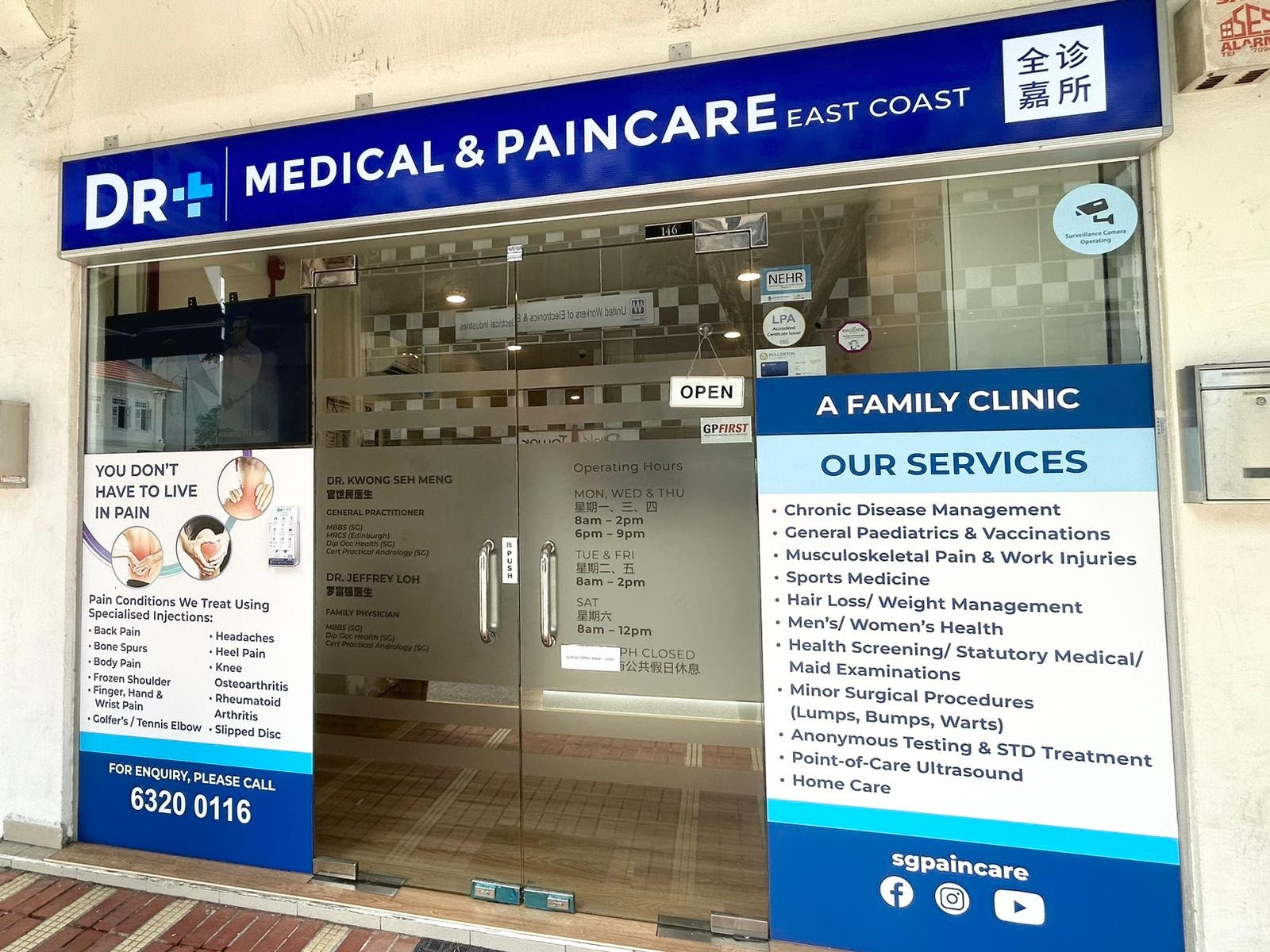Erectile Dysfunction

Erectile Dysfunction
Erectile dysfunction (ED) refers to the ongoing difficulty in getting or maintaining an erection firm enough for sexual activity. Although occasional difficulty is common, persistent ED can affect quality of life, relationships, confidence, and may signal underlying health concerns. It becomes more prevalent with age — many men in Singapore experience some degree of ED by their 40s and beyond.
What Is Erectile Dysfunction?
An erection occurs when nerves, blood vessels, hormones, and muscles work together to increase blood flow to the penis. Erectile dysfunction happens when this process does not function consistently.
ED is typically diagnosed when erection difficulties persist for several months and interfere with sexual activity. It is not simply a normal part of ageing, and effective treatments are available.
Symptoms of Erectile Dysfunction
Men with erectile dysfunction may experience:
-
Difficulty achieving an erection
-
Difficulty maintaining an erection during intercourse
-
Reduced firmness of erections
-
Reduced sexual desire in some cases
Occasional erection difficulties can happen during periods of stress or fatigue. Persistent symptoms, however, should be medically assessed.
Causes Risk Factors for Erectile Dysfunction
Several factors increase the likelihood of ED:
- Age: The prevalence of ED rises with age.
- Medical Conditions: Heart disease, stroke, diabetes, high blood pressure, urinary issues, and certain cancers.
- Lifestyle Factors: Smoking, alcohol consumption, poor diet, and sedentary lifestyle.
Physical Causes of ED
- Poor blood flow to the penis
Heart disease, diabetes, smoking, or hardened arteries limit the amount of blood reaching the penis, making it difficult to get an erection.
- Venous leak (penis cannot trap blood during an erection)
Sometimes blood enters the penis but escape too quickly, making it difficult to sustain an erection.
- Nerve Signal Disruption
Erections require proper communication between the brain, spinal cord, and penis. Diseases such as multiple sclerosis, Parkinson’s disease, spinal cord injuries, or pelvic injuries can interrupt these nerve signals, making it hard to initiate or maintain an erection.
- Diabetes-related complications
Chronic high blood sugar can damage small blood vessels and nerves in the penis. This microvascular and nerve damage reduces sensitivity and blood supply, directly impacting erectile function.
- Effects of Cancer Treatments
Surgery or radiation for prostate, bladder, or colorectal cancers can damage nerves, blood vessels, or surrounding tissue critical for erections. Men who have undergone these treatments may experience temporary or permanent ED and should consult a medical professional for sexual health support.
- Medication side effects
Certain medications for conditions such as high blood pressure, depression, or prostate enlargement can interfere with hormonal balance, nerve signals, or blood flow, potentially reducing erectile ability.
Emotional and Psychological Causes of Erectile Dysfunction
- Stress, anxiety, or depression
These conditions can reduce sexual desire and make it difficult for the brain to signal the penis to become erect.
- Relationship conflicts
Emotional tension or unresolved issues with a partner can affect sexual arousal and performance.
- Work or home pressures
Chronic stress from professional or personal responsibilities can lower libido and contribute to ED.
- Performance anxiety or cultural pressures
Worrying about sexual performance, social expectations, or cultural norms can create a cycle of ongoing erectile difficulties.
How Is Erectile Dysfunction Diagnosed?
Diagnosis begins with a detailed medical and sexual history, followed by a physical examination. Depending on the individual, further assessments may include:
-
Blood tests to check hormone levels, blood sugar, and cholesterol
-
Assessment of cardiovascular risk factors
-
Review of current medications
-
In selected cases, imaging tests to evaluate penile blood flow
The aim is not only to confirm erectile dysfunction, but also to identify contributing health issues that may require treatment.
Treatment Options for Erectile Dysfunction
Lifestyle and Health Optimisation
For many men, improving overall health can significantly improve erectile function. This may include:
-
Improving diet and physical activity
-
Weight management
-
Smoking cessation
-
Reducing alcohol intake
-
Managing stress and sleep
Oral Medications
Certain prescription medications can help improve blood flow to the penis. These are commonly used as first-line treatment and should be taken under medical guidance.
Medical Devices
Vacuum erection devices may help some men by drawing blood into the penis mechanically.
Extracorporeal Shockwave Therapy (ESWT)
Extracorporeal Shockwave Therapy (ESWT) is a non-invasive treatment that uses low-intensity acoustic waves to stimulate blood vessel growth and improve blood flow in penile tissue.
This approach is drug-free and may be suitable for men with blood flow-related erectile dysfunction. Treatment is performed over multiple sessions, usually with minimal discomfort and no downtime. Some men experience gradual improvement over several weeks, with benefits that may last months.
This treatment is offered at DR+ Medical & Paincare East Coast.
Hormonal Treatment
For men with clinically low testosterone, hormone treatment may be considered after proper evaluation.
Injection or Surgical Options
In more severe cases, other medical or surgical treatments may be discussed if conservative options are ineffective.
Are Your Symptoms Affecting Your Quality Of Life?
Consult one of our DR+ today for a detailed consultation & personalised treatment plan.
Our Clinics
- Mon & Thu: 8:00am – 2:00pm, 6:00pm – 9:00pm
- Tue, Wed & Fri: 8:00am – 2:00pm
- Sat: 8:00am – 12:00pm
- Sun: 10:00am – 1:00pm
- PH: Closed
Need Advice On Your Condition?
Please fill out the form and we will be in touch with you shortly.
Frequently Asked Questions
Will Erectile Dysfunction go away on its own?
Erectile Dysfunction (ED) usually does not improve without treatment. Occasional difficulties caused by stress, fatigue, or alcohol may resolve naturally, but ongoing ED often signals an underlying health issue. Lifestyle changes such as quitting smoking, regular exercise, and a balanced diet can help. Consult a primary care doctor for proper diagnosis and personalised ED treatment.
When should I see a doctor for Erectile Dysfunction (ED)?
Talk to a primary care doctor if you suspect you have erectile dysfunction. They can help diagnose ED, identify its cause and recommend the best treatment option for you. Early medical advice can improve sexual health outcomes.
How do I know if I am suitable for shockwave therapy for erectile dysfunction?
You may be suitable for shockwave therapy for erectile dysfunction (ED) if you have mild to moderate ED, especially if it is related to reduced blood flow or vascular health. This treatment is ideal for men looking for a non-invasive and drug-free option. However, it may not be suitable for those with severe ED, certain medical conditions, or penile implants. Our doctor can assess your medical history, conduct an evaluation, and determine if shockwave therapy is right for you.
How many shockwave treatments do I need for Erectile Dysfunction?
Treatment with shockwave therapy for erectile dysfunction usually involves 6–12 sessions, typically conducted twice a week, with each session lasting 15–20 minutes. Our doctor can assess your condition and design a personalised treatment plan to achieve the best results.
How long do the effects of shockwave therapy last?
Most men experience improved erectile function for 12–24 months after shockwave therapy for ED. Booster sessions may be recommended to maintain these benefits. Our doctor can advise on follow-up care and monitoring.
Are there side effects of shockwave therapy for Erectile Dysfunction?
Side effects are minimal. Some men report mild redness, swelling, or tingling at the treatment site, which usually resolves within a few hours. Our doctor can explain what to expect before and after shockwave therapy for ED during consultation.

